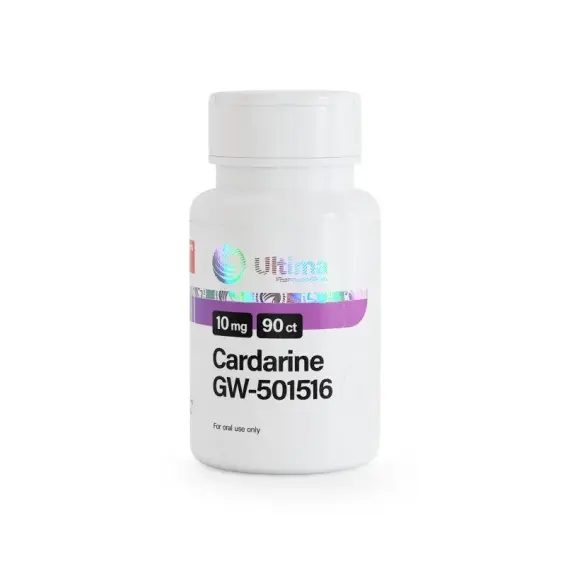- Active Substance: Cardarine
- Concentration: 10 mg/tab
- Pack Size: 90 caps
- Manufacturer: Ultima Pharmaceuticals
- Brand Name: Cardarine
Explore Enhanced Endurance and Fat Loss with Cardarine (GW-501516) 10mg Capsules
You're looking at Cardarine (GW-501516), a research chemical that acts as a potent PPARδ (peroxisome proliferator-activated receptor delta) agonist. It is investigated for its potential to significantly improve endurance, promote fat loss by increasing fatty acid oxidation, and offer benefits to cardiovascular health.
Key Features:
- PPARδ Receptor Agonist: Activates the PPARδ pathway, leading to various metabolic benefits.
- Enhanced Endurance: Research suggests it can significantly improve exercise capacity and stamina.
- Promotes Fat Loss: May increase fatty acid oxidation, leading to a reduction in body fat.
- Potential Cardiovascular Benefits: Studies have indicated potential positive effects on cholesterol levels and blood vessel function.
- Non-Stimulant: Does not have stimulant properties.
- Oral Administration: Convenient capsule form for easy dosing in research settings.
- 10 mg per Capsule: Allows for precise dosage control in research protocols.
- Pack Size: 90 Capsules: Provides a substantial supply for research protocols.
- Ultima Pharmaceuticals: A manufacturer of research-grade compounds.
Mechanism of Action:
Cardarine (GW-501516) binds to and activates the PPARδ receptor, a nuclear receptor that plays a crucial role in regulating energy homeostasis, lipid metabolism, and glucose metabolism. Activation of PPARδ by Cardarine leads to:
- Increased Fatty Acid Oxidation: Enhances the breakdown of fatty acids for energy, contributing to fat loss.
- Improved Glucose Metabolism: May improve insulin sensitivity and glucose utilization.
- Enhanced Mitochondrial Biogenesis: Can increase the number of mitochondria in muscle cells, potentially leading to increased energy production and endurance.
- Changes in Lipid Profile: Research has shown potential for increased HDL (good cholesterol) and decreased LDL (bad cholesterol).
Potential Benefits:
- Significant Improvement in Endurance and Exercise Capacity.
- Effective Fat Loss through Increased Fatty Acid Oxidation.
- Potential Positive Effects on Cholesterol Levels.
- May Improve Insulin Sensitivity.
- Non-Catabolic: May help preserve muscle mass during calorie deficits.
Use in Combination:
Cardarine is a versatile research compound and has been explored in combination with various other substances in research settings:
- SARMs: Often researched in stacks with SARMs to enhance both muscle growth and fat loss/endurance.
- Anabolic Steroids: Some research has investigated its use alongside anabolic steroids for potential synergistic effects on body composition and performance.
- Other Fat Loss Agents: Explored in combination with other compounds aimed at fat reduction.
Possible Research Applications:
- Studies on improving endurance and exercise performance.
- Research into novel strategies for fat loss and metabolic health.
- Investigating potential benefits for cardiovascular health and lipid profiles.
- Understanding the role of PPARδ activation in various physiological processes.
Usage Guidelines:
Cardarine (GW-501516) is an investigational compound and dosage guidelines are primarily based on ongoing research:
- Administration: Oral consumption via capsules.
- Dosage: Research dosages have typically ranged from 10-20 mg per day. Lower doses have also been explored. Optimal dosage is still under investigation.
- Cycle Length : Research cycle lengths have varied, commonly ranging from 4-12 weeks. Longer-term effects are still being studied.
Potential Side Effects:
The safety profile of Cardarine has been a subject of controversy. While early studies showed promising results, some longer-term animal studies raised concerns about potential carcinogenic effects. Therefore, the potential risks in humans are not fully understood and should be a significant consideration in any research context. Potential side effects that have been discussed include:
- Potential for Cancer Development (based on some animal studies).
- Changes in Cholesterol Levels (both positive and negative effects have been reported).
- Possible Liver Enzyme Elevations.
- Headache.
- Nausea.
- The long-term effects in humans are largely unknown and carry potential risks.
Important Considerations:
- Research Compound: Cardarine is primarily a research compound. Its use outside of controlled research settings carries significant risks due to the uncertainties surrounding its long-term safety in humans, particularly regarding potential carcinogenic effects.
- Regulatory Status: The legal status of Cardarine may vary significantly by region. It is often prohibited in competitive sports.
- Purity and Quality: When obtaining research compounds, ensuring purity and quality from reputable sources is crucial.
- Ethical Considerations: Research involving Cardarine should always adhere to ethical guidelines and regulations, with a strong emphasis on understanding and mitigating potential risks.
What is Cardarine (GW-501516)?
Cardarine (GW-501516) is a research chemical that acts as a PPARδ receptor agonist, investigated for its potential to improve endurance and promote fat loss.
What are the potential benefits of Cardarine in research?
Potential benefits in research include enhanced endurance, fat loss through increased fatty acid oxidation, and potential positive effects on cholesterol levels.
What are typical research dosages and cycle lengths for Cardarine?
Research dosages have typically ranged from 10-20 mg per day for 4-12 week cycles. Optimal dosage is still under investigation.
What are the potential side effects of Cardarine in research?
Potential side effects under investigation include the potential for cancer development (based on some animal studies), changes in cholesterol levels, and possible liver enzyme elevations. The long-term effects in humans are largely unknown and carry potential risks.
